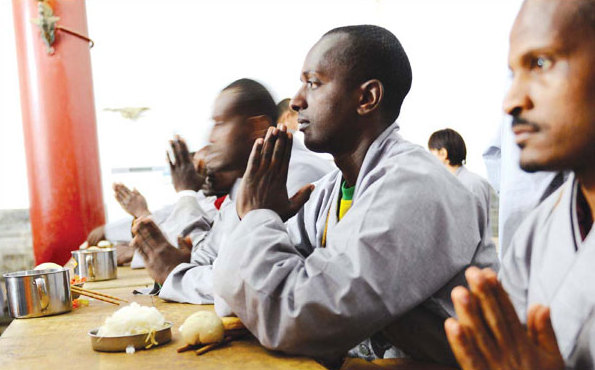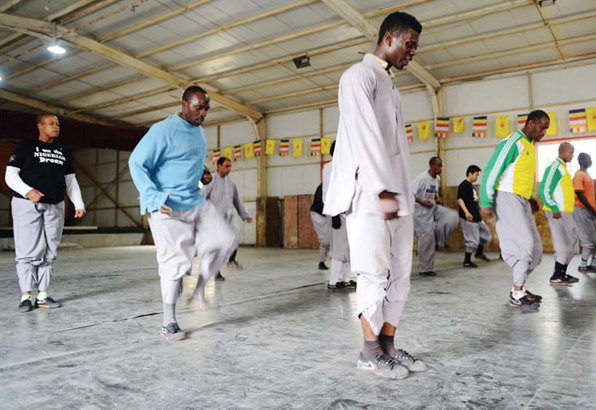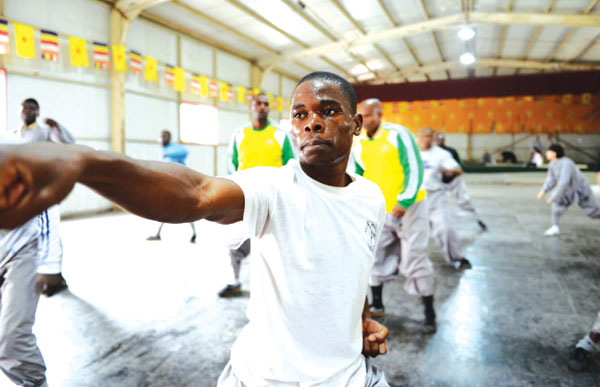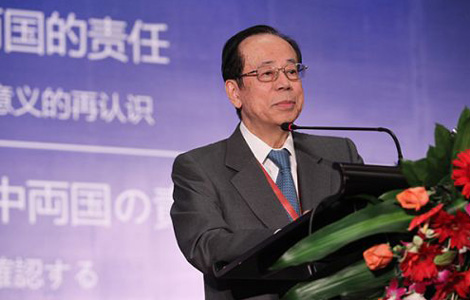Path to inner peace
Updated: 2013-10-29 07:27
By Qi Xin in Dengfeng and Han Bingbin in Beijing (China Daily)
|
||||||||
My China Dream | Africans at Shaolin
A cultural exchange course offers young Africans a tough but rewarding experience at the famous Shaolin Temple. Qi Xin in Dengfeng and Han Bingbin in Beijing report.
At 4 am in a hotel in Dengfeng, Henan province, a 32-year-old Nigerian woman, Peace Emezue, wakes to the cries of "jihe"! ("assemble"). Half an hour later, still sleepy, she shows up in the lobby to join 19 other young Africans, all dressed in gray robes and canvas shoes.
They walk in two lines for 15 minutes to the Shaolin Temple. This is the routine six days a week while living the life of a Shaolin monk. Founded in the fifth century, the monastery is long famous for its association with Chinese martial arts and particularly with Shaolin kung fu.
|
African students join the monks for the lunch at Shaolin Temple that begins with a ritual before eating. Photos by Xiang Mingchao / China Daily |
|
Peace Emezue (left) and her fellow African students warm up before attending their kung fu class at the temple. |
|
Tende Uswege Mwaseba, 25, from Tanzania, practices kung fu with his classmates. |
The morning classes start with these "disciples" closely following the monks' moves and listening to them chanting, a chance to observe and hopefully experience for themselves a state of tranquility.
Like her name, Peace Emezue says she has sensed the spiritual moment several times.
"When I came to Shaolin, I was surprised because the life here is peaceful and simple," she says. "But it is also quite tough - the morning exercises, the hard training. We do it every day except Sundays. It is a lifestyle I am not used to, but I am getting used to it now."
To strengthen cultural exchanges between China and Africa, the Ministry of Culture launched the "Shaolin Kung Fu Training Class for African Disciples" last month, enrolling 20 students from Tanzania, Ethiopia, Mauritius, Uganda and Nigeria. The course lasts three months.
Emezue is one of only three women in the group. The other two are Chinese-Africans from Mauritius. As a karate champion, Emezue was chosen by her local government for the program to encourage women in Nigeria to take up martial arts, especially kung fu.
"Women also love kung fu and Chinese culture, and I will return and teach my ladies how to meditate and do the moves of kung fu and qigong (breathing exercise)," she says. "Since I came here, the training has really made me strong, especially my legs, because we do a lot of running and mountain climbing."
Wang Yumin, dean of the Shaolin Temple's foreign affairs office, says many foreigners are attracted to Shaolin because of its reputation for kung fu and its use in Buddhism.
Shi Yanbo, a kung fu master at the temple, says many of the disciples had experience in other martial arts or had learned moves from watching films, but simulating them was not enough. Kung fu is deeply rooted in the culture, he says.
So students also have to learn meditation and study Buddhist doctrines that guide people's actions. To help them gain greater understanding of Chinese kung fu, the students are also offered Chinese language courses.
Zhang Lifei, the group's Mandarin teacher, says because the 20 African disciples do not speak the same African language, they are divided into two groups, each containing someone who can speak English and can help the others.
"I can speak a little French," Emezue says. "By paraphrasing, I help them to understand what the teacher is saying."
When the morning culture and language class is over, the students join the monks for a typical temple lunch that begins with a ritual.
One of the monks walks out of the dining hall with a bowl of rice. After gently tapping on a wooden fish, he places a ball of rice on a stone as a tribute to all beings, while the monks and students chant from scriptures and clap their hands until tapping of the wooden fish again signals the start of the meal.
Then they all eat in silence.
"Life in the Shaolin Temple is unimaginably lovely and peaceful. It's not like the real world where there is so much hustle," Emezue says.
"I have found a lot of peace of mind here and to be at peace with myself. I would like to teach more people how to do that."
Contact the writers at qixin@chinadaily.com.cn and hanbingbin@chinadaily.com.cn.
(China Daily USA 10/29/2013 page8)
 ABC apologizes for 'Kimmel' joke
ABC apologizes for 'Kimmel' joke
 Ellis Island reopens for 1st time since Sandy
Ellis Island reopens for 1st time since Sandy Lang Lang named UN Messenger of Peace
Lang Lang named UN Messenger of Peace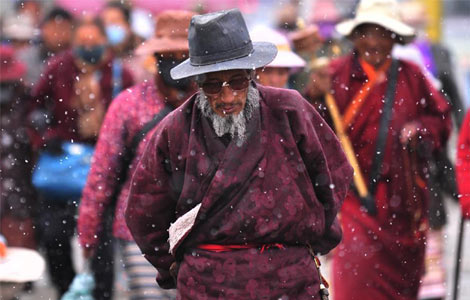
 Snowfall hits many areas of Tibet
Snowfall hits many areas of Tibet  Antiquated ideas source of Abe strategy
Antiquated ideas source of Abe strategy
 Storm wrecks havoc in S Britain, leaving 4 dead
Storm wrecks havoc in S Britain, leaving 4 dead
 Women's congress aims to close income gap, lift status
Women's congress aims to close income gap, lift status
 Sao Paulo Fashion Week held in Brazil
Sao Paulo Fashion Week held in Brazil
Most Viewed
Editor's Picks

|

|

|

|

|

|
Today's Top News
Albright counsels fact not myth in relations
Is Obama's lack of transparency really his fault?
San Diego Symphony debuts at Carnegie
Lang Lang takes on UN `Messenger of Peace’ role
At 72, China’s ‘Liberace’ still wows fans
Penn State: 26 people get $59.7m over Sandusky
China providing space training
Miscommunication causes conflicts
US Weekly

|

|
